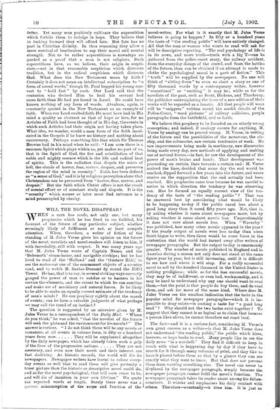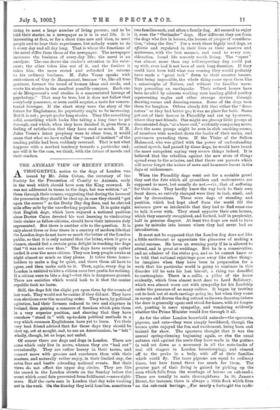WILL THE NOVEL DISAPPEAR?
WHEN a man has made, not only one, but many prophecies which he has lived to see fulfilled, his forecast of the future of any particular subject, whether seemingly likely of fulfilment or not, at least compels attention. When, therefore, a writer of fiction of the standing of M. Jules Verne gives his opinion on the future of the novel, novelists and novel-readers will listen to him, if with incredulity, still with respect. It was many years ago that M. Jules Verne wrote of Captain Nemo, and the 'Behemoth' steam-house, and navigable airships; but he has lived to read of the 'Holland' and the Gustave Zede,' to see the motor-car one of the commonest objects of a country road, and to watch M. Santos-Dumont fly round the Eiffel Tower. He has, that is to say, in several striking ways correctly gauged the power of man to subdue or to harness in his service the elements, and the extent to which he can combine and make use of machinery and natural forces. Is he likely to be able to make an equally correct estimate of the tendency of men's minds ? He can prophesy rightly about the march of events; can he form a valuable judgment of what perhaps we may call the trend of an instinct ?
The question is suggested by an interview given by M. Jules Verne to a correspondent of the Daily Mail. "Where do you think," he was asked, "that the novelist of the future will seek the plots and the environment for his novels?" The answer is curious. "I do not think there will be any novels or romances, at all events in volume form, in fifty or a hundred
years from now They will be supplanted altogether by the daily newspaper, which has already taken such a grip sf the lives of the progressive nations They are not necessary, and even now their merit and their interest are fast declining. As historic records, the world will file its newspapers. Newspaper writers have learnt to colour every- day events so well that to read them will give posterity a truer picture than the historic or descriptive novel could do, and as for the novel psychological, that will soon cease to be, and will die of inanition in your own lifetime." We quote the reported words at length. Surely there never was a queerer misconception of the scope and function of the novel-writer. For what is it exactly that IL Jules Verne believes is going to happen ? In fifty or a hundred years the taste of "the reading public" will have entirely changed. All that the man or woman who wants to read will ask for will be descriptive reporting. "The real psychology of life is in its news, and more truth—truth with a big T—can be gathered from the police-court story, the railway accident, from the everyday doings of the crowd, and from the battles of the future, than can be obtained if an attempt is made to clothe the psychological moral in a garb of fiction." This "truth" will be supplied by the newspapers. No one will think of "sitting down" to even so short a story as one of fifty thousand words by a contemporary writer, however " sensational " or " exciting " it may be ; while as for the novelists of the past, such as Scott, Dickens, and Thackeray, the publisher contemplating the issue of a new edition of their works will be regarded as a lunatic. All that people will want will be " snippets " written round the sordid details of the Police-Court, "word pictures" of railway collisions, purple paragraphs from the battlefield, and so forth.
We believe this prophecy to be founded on an utterly wrong conception; and indeed, if analogy counts for anything, M.
Verne by analogy can be proved wrong. M. Verne, in writing of the future and the possibilities of the motor-car, the air- ship, and the submarine, saw certain tendencies at work. He
saw improvements being made in machinery, new discoveries being made every day, new methods of applying and making use of natural forces,—in fact, he saw the development of the power of man's brains and hands. That development was proceeding on certain lines towards a certain end: M. Verne noticed the lines, decided that some day the end would be reached, dipped forward a few years into the future, and wrote stories on the supposition that the end actually had been reached. His prophecies came true because he was careful to notice in which direction the tendency he was observing ran. Has he formed an equally correct view of the ten- dency of the taste of "the reading public " ? That can be answered best by considering what would be likely to be happening to-day if the public cared less about a good long story than it cared fifty years ago. Not, that is, by asking whether it cares about newspapers more, but by asking whether it cares about novels less. Unquestionably it does not care about novels less. When " Waverley " was published, how many other novels appeared in the year? If the yearly output of novels were less to-day than when Scott began to write, then there would be some force in the contention that the world had turned away after writers of newspaper paragraphs. But the output to-day is enormously greater. The number of novels published in England and in America during a season not only does not stand at the same figure year by year, but is still increasing, until it is difficult to see how and where it will stop. For a really successful novel to sell by the hundred thousand in the United States is nothing prodigious; while as for the less successful novels, they may be of indifferent, or even bad, workmanship, and it may be hard to understand why any one should want to read them,---but the point is that people do buy them, and do read them, and ask for more of the same kind. Where does M. Jules Verne see the smallest indication that the taste in the popular mind for newspaper paragraphs—which it is im- possible to deny exists—is ousting a taste for "a good long read " ? Why should not the two tastes exist together ? To suggest that they cannot is as logical as to claim that because a person likes olives, he cannot therefore eat roast beef.
The fact—and it is a curious fact, considering M. Verne's own great success as a writer—is that M. Jules Verne does not understand"the reading public," the public which hires, borrows, or buys books to read. Many people like to see the daily news "in a nutshell." They find it difficult to keep in touch with what is happening day by day if they have to search for it through many columns of print, and they like to have it placed before them so that by a glance they can see exactly what they want to know. But that does not prevent them from wanting something else. The novel can never be displaced by the newspaper paragraph, simply because the newspaper paragraph cannot fulfil the novel's function. The newspaper paragraph takes its reader about among his fellow- creatures. It widens and emphasises his daily contact with others. Therefore—eventually—it tires him. It is just as tiring- to meet a large number of living persons, and to be told their stories, in a newspaper as it is in real life. It is interesting at first, or for a short time now and then, to meet people and to hear their experiences, but nobody wants to do it every day and all day long. That is where the functions of the novel differ from those of the newspaper. The newspaper increases the business of every-day life; the novel is an anodyne. The one draws the reader's attention to his exist- ence ; the other takes him out of it, and the further it takes him, the more rested and refreshed he returns to his ordinary business. M. Jules Verne speaks with enthusiasm of Guy de Maupassant, because "he, like all true geniuses, foresaw the trend of human ideas and needs, and wrote his stories in the smallest possible compass. Each one of de Maupassant's soul studies is a concentrated lozenge of psychology." That may be true, but it does not follow that everybody possesses, or even could acquire, a taste for concen- trated lozenges. If the short story were the story of the future for Englishmen, its popularity ought to be increasing. But it is not; people prefer long stories. They like something solid, something which looks like taking a long time to get through, and which, when they have finished it, gives them a feeling of satisfaction that they have read so much. If M. Jules Verne's latest prophecy were to come true, it would mean that what we have called the "trend of instinct" of the reading public had been suddenly reversed. That is not what happens with a marked tendency towards a particular end; nor will it be the case, we think, with the future of novels and their readers.















































 Previous page
Previous page